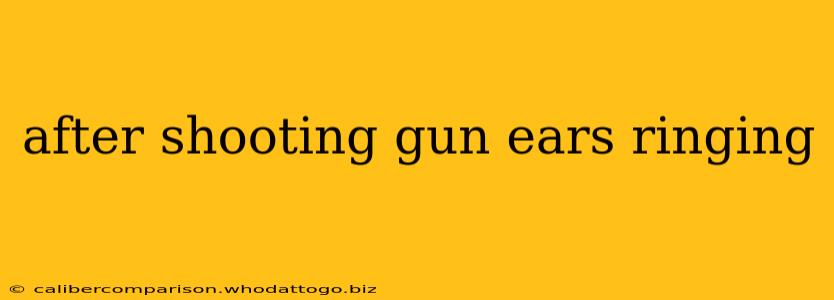Experiencing ringing in your ears after shooting a gun? You're not alone. This common phenomenon, known as tinnitus, is often temporary, but it's crucial to understand its causes and take appropriate precautions to protect your hearing. Ignoring the issue could lead to permanent hearing damage.
Understanding the Link Between Gunfire and Tinnitus
The intense noise generated by firearms is the primary culprit behind post-shooting tinnitus. The sound waves produced are far beyond the safe exposure levels for human hearing. These powerful sound waves can damage the delicate hair cells within the inner ear, responsible for transmitting sound signals to the brain. This damage can manifest as temporary or, in severe cases, permanent ringing, buzzing, or hissing in the ears. The severity depends on several factors, including:
- The type of firearm: Higher-caliber weapons generally produce louder sounds and pose a greater risk.
- The proximity to the firearm: Being closer to the muzzle significantly increases noise exposure.
- The use of hearing protection: Proper hearing protection is crucial in mitigating the risk of hearing damage.
- Duration of exposure: Repeated or prolonged exposure to gunfire increases the cumulative damage to the inner ear.
What to Do if Your Ears Are Ringing After Shooting
If you experience ringing in your ears after shooting, take these steps:
1. Immediate Actions:
- Leave the noisy environment: Move away from the shooting range or area to minimize further noise exposure.
- Rest your ears: Avoid loud noises as much as possible.
- Hydration: Stay well-hydrated, as this can aid in the body's natural healing process.
2. Monitoring Your Symptoms:
- Duration: Note how long the ringing persists. If it lasts for more than a few hours or days, seek medical attention.
- Severity: Assess the intensity of the ringing. A significant or unbearable ringing warrants immediate medical consultation.
- Accompanying Symptoms: Pay attention to other potential symptoms like hearing loss, pain, dizziness, or fullness in the ears.
3. Seeking Professional Help:
If the ringing persists or is accompanied by other symptoms, consult an audiologist or ENT specialist. They can perform a comprehensive hearing evaluation and determine the extent of any hearing damage. Early intervention is key to managing tinnitus and preventing further hearing loss.
Prevention is Key: Protecting Your Hearing at the Shooting Range
Preventing hearing damage from gunfire is far more effective than treating it afterward. Here are some essential preventative measures:
- Always wear hearing protection: This includes earmuffs or earplugs, or ideally, both (for maximum protection). Ensure they are properly fitted and rated for the noise levels expected.
- Maintain a safe distance: Even with hearing protection, maintaining a safe distance from the firearm reduces noise exposure.
- Limit exposure: Take breaks from shooting to allow your ears time to recover.
- Regular hearing check-ups: Undergo regular hearing tests, especially if you frequently engage in shooting activities.
The Importance of Hearing Conservation
Hearing loss is often irreversible. Taking proactive steps to protect your hearing at the shooting range is vital for long-term auditory health. By understanding the risks and taking appropriate precautions, you can enjoy your shooting hobby without compromising your hearing. Remember, your hearing is a precious sense—protect it!

